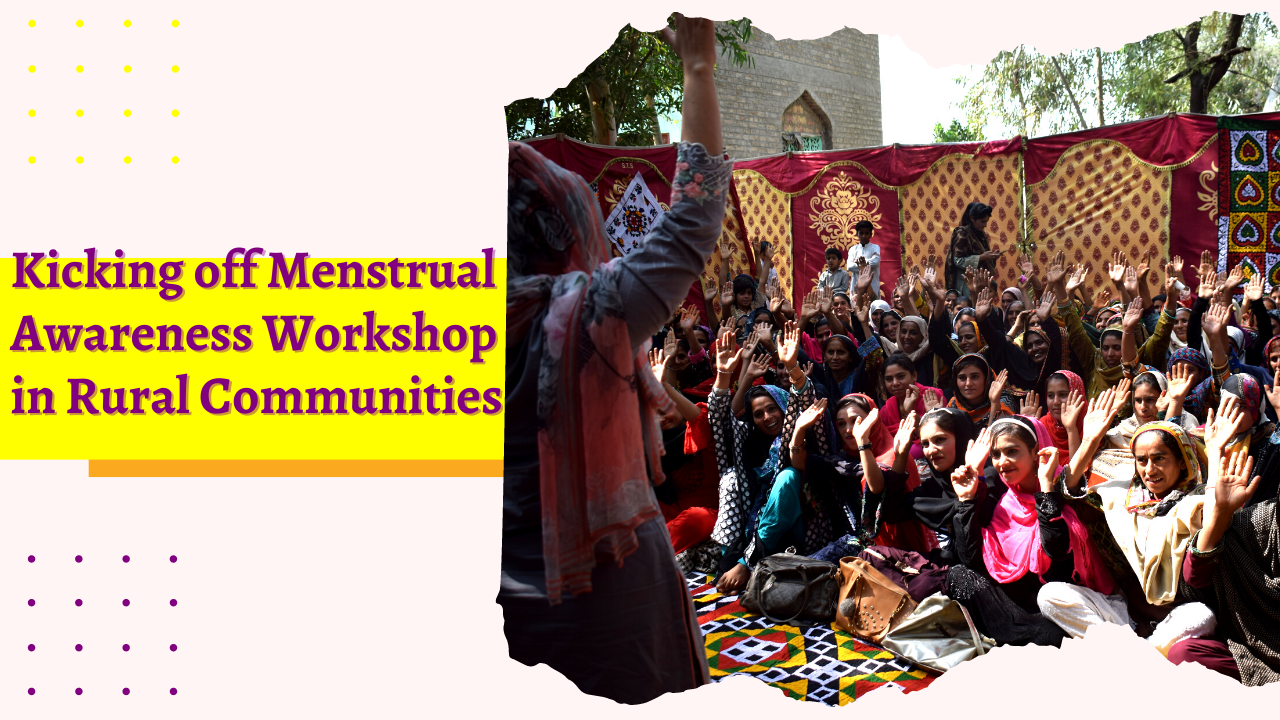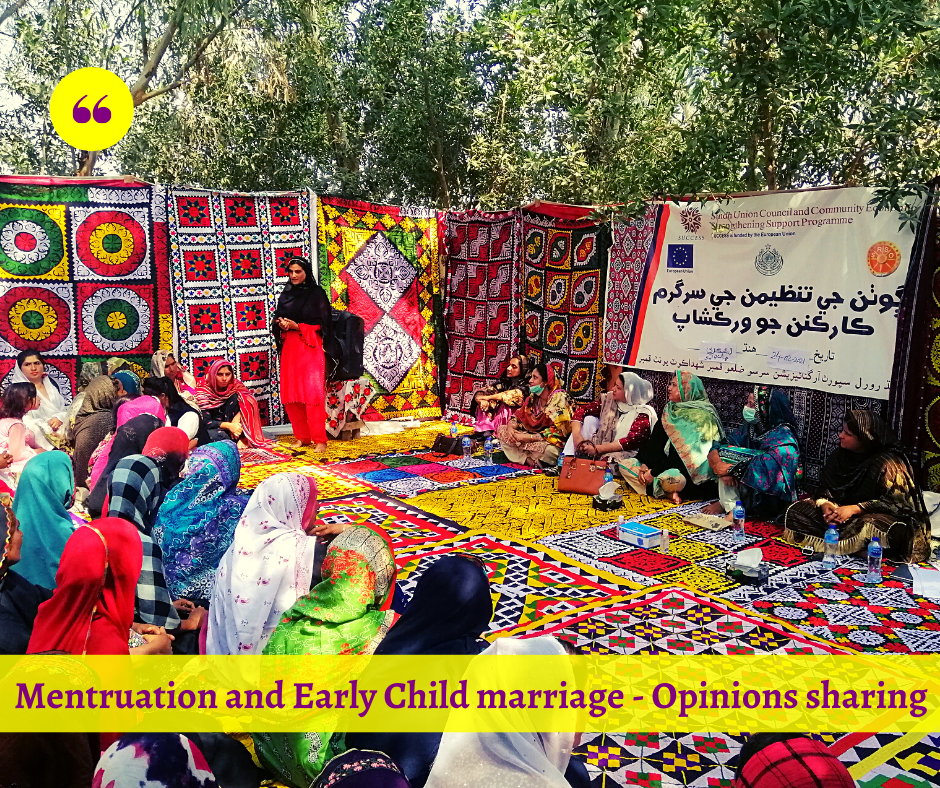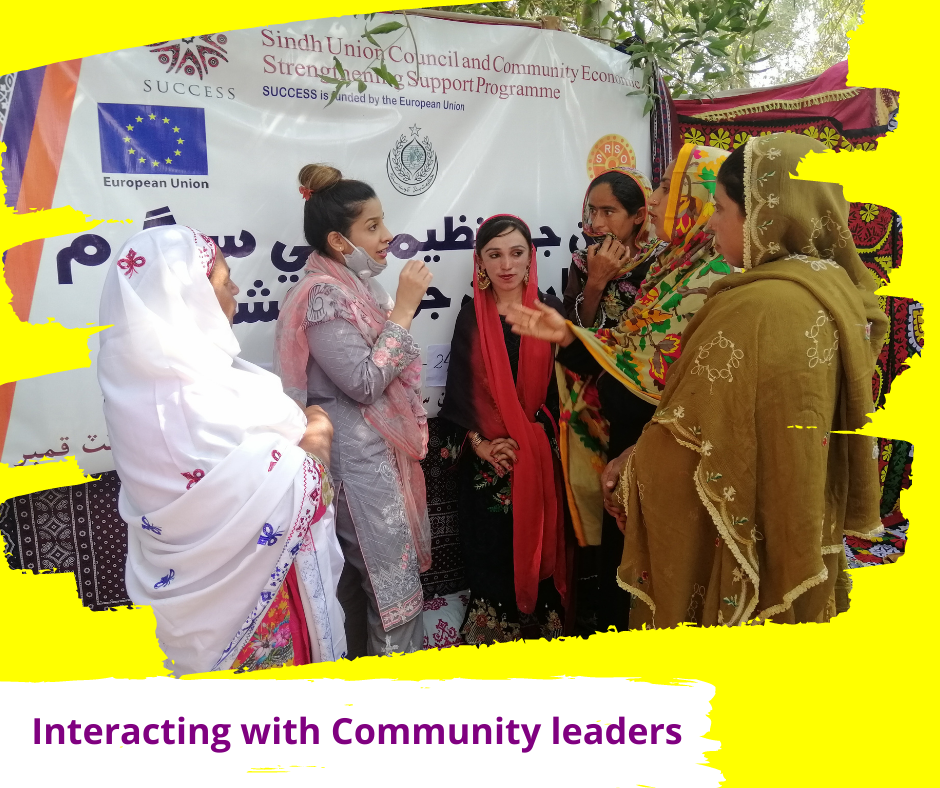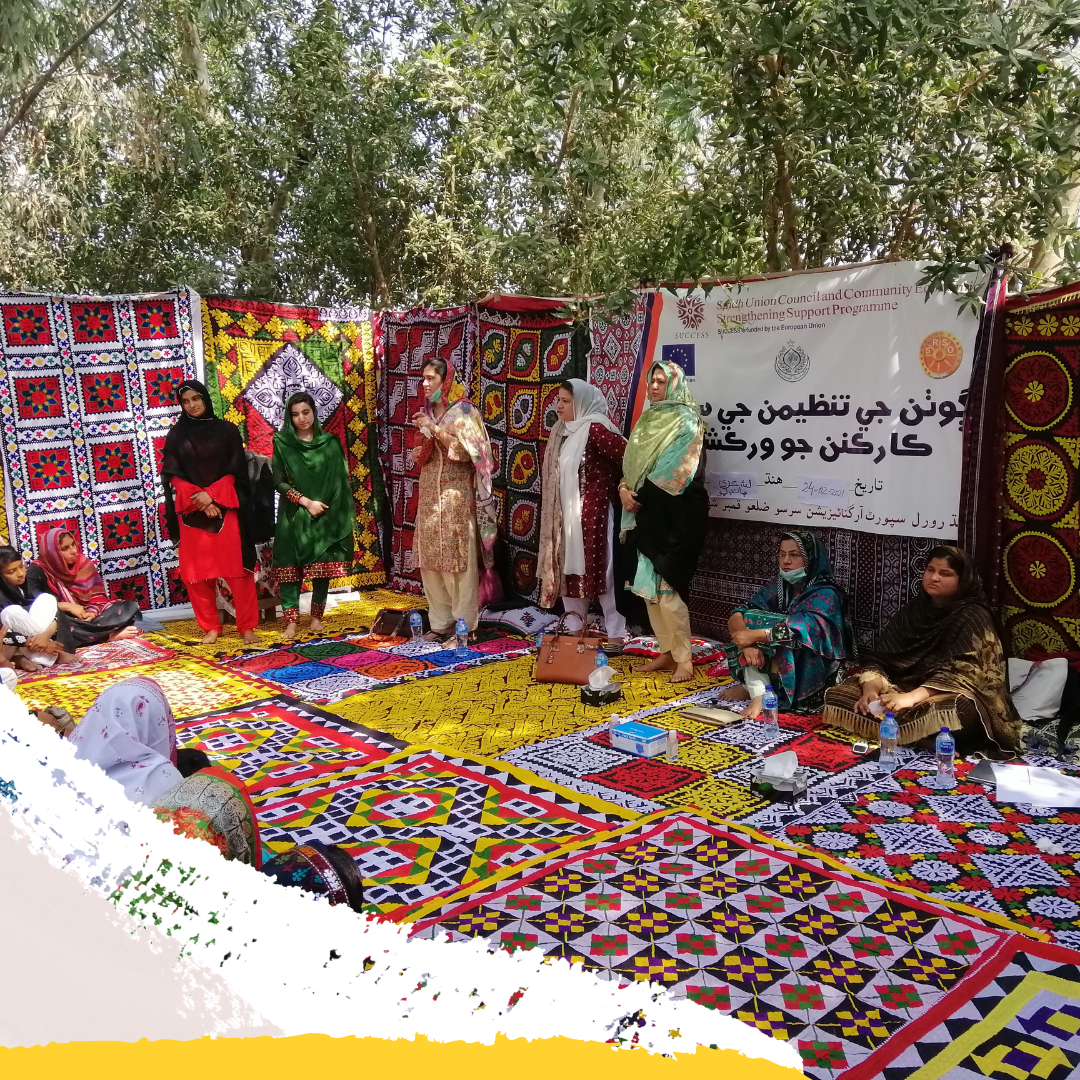Raaji’s largest menstrual awareness session to date
Our field trip to the EU-funded SUCCESS programme districts led us to Kamber-Shahdadkot in February 2021. With its vast plains, agricultural fields, and the mighty Kirthar mountain range, the district has a diverse set of features. Baloch and Sindhi people from the Brahui tribe comprise the majority of the indigenous inhabitants. Our field partner Sindh Rural Support Organization (SRSO) had organized an activist workshop on Menstrual Health Awareness, allowing us to engage with over 50 community leaders/members, including Community Bookkeepers and Resource Persons from various villages within the district.
Adorned with colorful Sindhi cultural (Rillis) applique stuff, the venue looked so great! Only females and girls were invited to attend and speak on the topic. The women leadership could clearly be seen because the majority of the people including event planners, hosts, guest speakers and participants were women belonging to different villages, government departments and backgrounds.
Pulling together with Rural communities and Government officials of rural Sindh
We were welcomed by rural community women in the village of Lashkari Chandio. It was heartening to see that the SRSO team had also invited some guest speakers from the government departments including Ms. Shama Parveen, Deputy Director of Women Development Department, Ms. Sitara Hassan, HST Education (Teacher), Ms. Naseem Rind, Field Technical Officer from Population Welfare Department, Ms. Aneela Hakro and Ms. Mukhtiyar Gopang, Family Welfare Counsellors from the Population Welfare Department and Ms. Baby Bagri, a Social Activist from Kamber.
Our team with the SRSO staff and government officials from Kamber in an iconic picture.
We interacted with the crowd through storytelling, personal narratives, and opinion sharing on menstrual health and management. The District Manager of SRSO, Mr. Asad Ali Jatoi gave an introductory session on education, especially girls' education, as well as the role of government and community leaders in promoting education. Mr. Asad and other male staff members then left the venue, allowing females to talk about MHM freely.
Kicking off our menstrual awareness session
Following that, we began our session by telling the story of a girl who was going through her menarche. This was crucial in breaking the ice among the participants and encouraging them to speak up about this subject. We had a concern about the language barrier because the majority was Sindhi-speaking but we truly appreciate the SRSO staff for translating the conversation.
We asked the rural women how they deal with their menstrual cycle. Participants shared that they use sanitary pads, cloth, and a few also said they don't wear anything but change trousers/dresses multiple times during those days and stay at home.
The SRSO-SUCCESS Communications Officer supported us in running the question-and-answer session in the local language. The participants expressed village customs such as not taking showers, cooking or serving food during the periods.
Menstruation and Marriage, is this correlation appropriate?
Interestingly, we also found a link between menstruation and early child marriage. Menarche, or the first menstrual bleeding, is a major occurrence in the lives of girls, but it is often misinterpreted in rural areas as an indication that a girl is ready for marriage because she is growing up.
According to village customs, if a girl has her first menstrual cycle at the age of 8-11 years, she is ready for marriage, said one of the participants. She asked us how they could stop this. We explained to them that having periods at a young age does not imply that a girl is ready to start a family. Since her mind is still in the growing phase so she can’t manage to take this responsibility so early. Above all, she can marry legally after 18 years of age.
Correspondingly, some participants told us their first-period stories. Some of them kept their periods hidden because they didn't want to marry at an early age "It was Friday, and I had just returned from school," a courageous woman shared her story. “My dress had stains on it. Since I was closer to my grandmother than to my mother, I told her about the stains and broke down in tears. My parents had already tied my engagement to someone in my childhood. My grandmother advised me not to tell anyone about the stains. My Grandma knew that if I revealed, my parents would start thinking about my marriage. So, I kept this a secret for 6-7 months before my mother found out.”
Government officials' perspectives on menstrual health awareness
We also had the chance to engage with government representatives of the Population Welfare and Women Development Department. They were glad to see rural women discussing such a sensitive matter. “ An entire generation is connected to a woman. When a little girl is grown up, she gets married, bears children, manages a whole family and leads a generation. Then why have we not empowered her since childhood?” said one of the Guest speakers from Population Welfare, while addressing the rural women.
They also recommended that mothers should treat their daughters as friends and inform them about menstruation before their first cycle. It would be good for young girls who usually get depressed due to unawareness. They also invited us to speak about menstruation in high schools to raise awareness among young girls.
Takeaways:
We found some community members who continued their schooling after the marriage and became Community Resource Persons and Bookkeepers of their villages. This demonstrates that rural women face obstacles at every stage of their lives, but they are consistent in their pursuit of success and improvement.
The workshop brought into light some issues and stories related to period poverty and old practices, menstruation and early marriages, the importance of raising awareness in high girls schools, the significance of digital literacy and education and the government’s role in spreading awareness.
The workshop became a source of networking as rural women directly interacted with us and shared their contact numbers so that they can continue getting information on MHM.
We learned that involving government departments could support us in raising awareness in rural Sindh's untapped areas, which we have yet to approach.
Community leaders are aware of their village's customs, and they are now raising their voices actively against early child marriages.
Reporting contributions by Ms. Anjum Malik, SUCCESS Communications Officer RSPN and Documentation & Reporting Officer SRSO Ms. Shaiwana Pathan.
.png)




